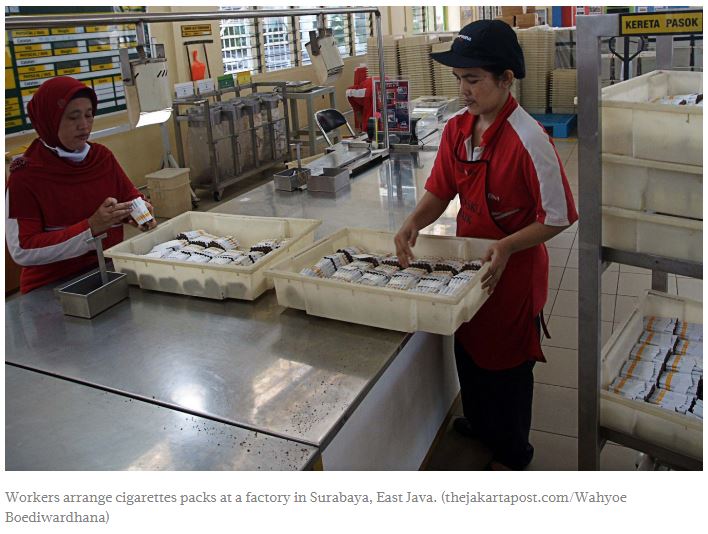Indonesia: Government criticized as soft on tobacco industry
Smoking has long been a habit in Indonesia that does not only involve adults but also affects minors, including elementary school students, and has led to swelling healthcare spending for smoking-related diseases. However, policy makers are reluctant to address the issue and are defending the cigarette business, critics say.
President Joko “Jokowi” Widodo’s decision not to increase the cigarette excise in 2019 betrayed his development agenda, in which he and Vice President Jusuf Kalla vowed to double the tax from 2015 to 2019, Indonesian Consumers Foundation (YLKI) chairman Tulus Abadi said.
“This decision is a terrible setback on excise policies,” Tulus told reporters in a press conference over the weekend, adding that the revenue from the excise was not comparable to the financial losses caused by smoking.
“The state has failed to understand the true [point] of the excise,” Tulus said.
The lack of tobacco control, he said, was a major contributor to noncontagious diseases covered by the Health Care and Social Security Agency (BPJS Kesehatan), with the prevalence increasing to 1.8 percent in 2018 from 1.4 percent in 2014, according to the Basic Health Survey.
The decision to keep the excise unchanged was ironic, he said, as the government had allocated 50 percent of the regional excise revenue to cover expenses incurred by BPJS Kesehatan, which is running at a deficit of Rp 16.5 trillion (US$1.17 billion).
Jokowi has increased the cigarette excise every year since assuming office but is not planning to do so in 2019. It went up by 10.04 percent in 2018, 10.5 percent in 2017, 11.3 percent in 2016 and 8.7 percent in 2015, according to Statistic Indonesia (BPS) data compiled by the Institute for Development of Economics and Finance (Indef).
Public policy analyst Azas Tigor Nainggolan said on the same occasion that, in reality, 25 percent of the healthcare claims covered by the BPJS were triggered by smoking. He cited the results of a study conducted by the Center for Indonesia’s Strategic Initiative (CISDI), which showed that heart disease and lung cancer made up 25 percent of BPJS claims.
The CISDI’s research also points out that for every Rp 150 trillion the government earned from the cigarette excise, it had to disburse Rp 600 trillion to treat patients with smoking-related diseases.
Tulus urged the government to increase the excise tax by 57 percent, as the accumulated increase since 2015 only reached about 40 percent.
The cigarette excise contributed Rp 153 trillion to state revenue in 2018, he said, adding that the revenue could reach Rp 350 trillion if the government had a firmer stance on its regulation.
Tulus also lamented the fact that Indonesia, as a major cigarette and tobacco producer, still had not joined the World Health Organization’s Framework Convention on Tobacco Control (FCTC), which had been ratified by 181 countries since 2003.
“We had high hopes that Jokowi would ratify the FCTC, but no such thing has happened up to his fifth year now.”
National Commission on Tobacco Control member Jalal said the government should start looking beyond the income from the cigarette excise, suggesting that its true use was to control cigarette consumption to prevent swelling BPJS claims.
The lack of cigarette control in the country also went against Indonesia’s commitment to fulfill the Sustainable Development Goals (SDGs) by 2030, which included the good health and wellbeing of citizens, he added.
“The government is treating the cigarette excise as a valuable compensation and a huge source of state revenue, but I see it as a mere fine [for cigarette producers] that hardly covers what they truly cost,” Jalal said at the event. (bbn)
Source: https://www.thejakartapost.com/news/2019/01/14/government-criticized-as-soft-on-tobacco-industry.html


 English
English




